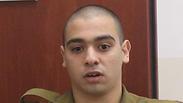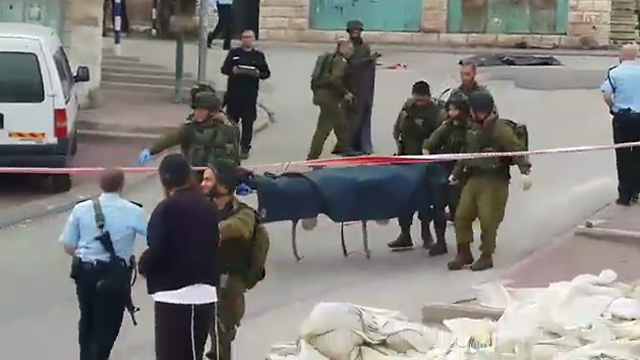
Sgt. Elor Azaria. Impossible situation
צילום: מוטי קמחי
Hebron shooting: A micromodel of Israel’s maladies
Op-ed: The upcoming ruling in the Elor Azaria trial is a reflection of the biggest problem the State of Israel is dealing with – the occupation.
The Elor Azaria trial is a micromodel of the state’s maladies, and as opposed to the rules of optics, or to the rules of television photography, the more one delves into the details, the wider one’s gaze becomes.

Omri Assenheim’s investigative report in the “Uvda” television program, about the shooting soldier from Hebron, presented a series of facts which we have known about for a long time in a professional and didactic way. Their collection and presentation, minute after minute, created a strong impression.

The Azaria case strengthens the suspicion that the presence of settlers influences soldiers’ operational responses
First of all, the alleged uniqueness of the incident. Similar incidents happen in the territories frequently. Hardly a week goes by, especially during the “knife intifada,” without a similar incident taking place: A regiment commander shooting a fleeing teen in the back because he is irritated by a stone thrown at his car (a rock, to be more exact, because stones are thrown by Neturei Karta while Arabs throw rocks); a young soldier firing at a Jordanian judge who talked back at him; a circle of Border Guard officers emptying full magazines of bullets at a terrorist lying on the ground at Nablus Gate.
Let’s admit it: Azaria is on trial only because there was a combination of two things there – the publication of a video shot by B’Tselem during the shooting, and the fact that it involves a simple soldier, a La Familia (Beitar Jerusalem’s supporters group) fan from Ramla. If the video had not been published, or if the shooter had been an officer from Ramat Hasharon or Elon Moreh, the incident would not have reached the heights it did. The politicians only jumped on the incident’s prominence. And every minister who rushed to open his mouth and comment on the issue was hiding another agenda behind his statement. It’s unnecessary to go back to those comments which have changed since then according to one’s position (Defense Minister Avigdor Lieberman) or the need to appear more right-wing than Naftali Bennett (Prime Minister Benjamin Netanyahu).
The Azaria case highlights another known fact: That the ones who control the occupied territories, manage them, direct the soldiery and the government workers and navigate the narrative are the settlers. The scene of the incident in Hebron was managed by the settlers, period. It doesn’t matter how many soldiers were in the area – two experienced settlers were the ones who set the tone.
This only strengthens the suspicion that wherever there are settlers alongside soldiers, including scenes of terror attacks, the settlers influence the soldiers’ operational responses. Only last week, a settler stood in the middle of the road in Hebron and refused to let three American tourists proceed, because one of them had a keffiyeh wrapped around her neck. The soldiers stationed around the settler to protect her refused to intervene, and the tourists turned around.
The army’s professionality has been stained by the shooting soldier affair too. The chief of staff reported, in an explicit and documented manner, that two-thirds of the army are employed in keeping the occupied territories (it’s unbelievable, but only one-third deal with the Arab states, Iran, submarines, F-15, Hezbollah, Hamas and all the other calamities). And since we are the world champions in occupation, as declared by Maj. Gen. (res.) Gadi Shamni, who defined himself as the champion of occupation, we should have been a bit more organized and efficient in this area.
But it would be naïve to expect the people’s army to be significantly more efficient than the people, and it turns out that the army is as professional and efficient as the National Insurance Institute, the Housing and Construction Ministry, the ports, the transportation or any other field. When you slightly rub off the coating, your eyes will grow dark. Especially when it has to do with an area in which our young soldiers are forced to engage in policing, and anyone who engages in this – apart from the settlers and their assistants – does it very unwillingly.
I don’t envy the judges who will have to decide on the shooting soldier’s sentence. On the one hand, there is no doubt that Azaria fired a bullet into an injured terrorist’s head under circumstances which do not justify this killing, and a state like ours must not start pardoning soldiers for such acts.
On the other hand, one cannot ignore the impossible situation which soldiers who have just finished high school are forced to deal with, with experienced terrorists taking over the scene while the officers’ mind is constantly distracted by background noises, two-way radios and cellular phones. Because after all and before anything else, this incident is a reflection of the biggest problem the State of Israel is dealing with, which is the occupation.










